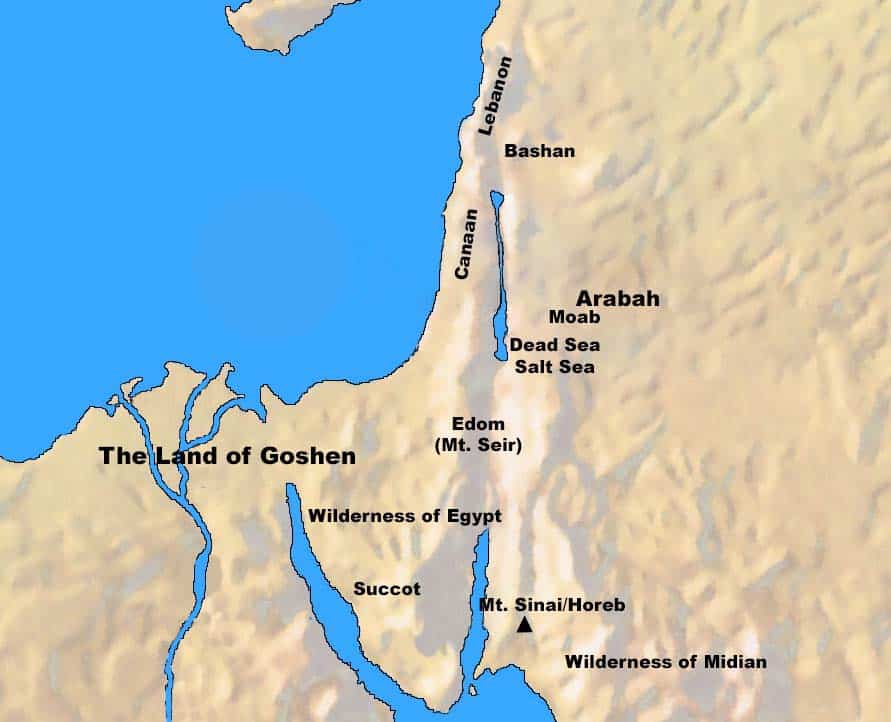Moses spells out the curses that will fall on the Israelites if they fail to obey their Suzerain (Ruler) God.
After the section of blessings in vv. 1-14, a series of curses is now presented, starting in v. 15 and extending through v. 68. They describe what would happen if the Israelites were disobedient to the Mosaic law. Vv. 15-19 state the curses that correspond to the six blessings in vv. 3-6. The rest of the chapter contains descriptions of how the curses would be implemented.
These cursings were to be stated by six tribes standing on Mount Ebal once Israel had entered the land and conquered this part of Canaan (Deuteronomy 27:13). Moses here continues the script for a ceremony to be accomplished once Israel entered the Promised Land. This continues his instructions to Israel just prior to entering the land (Deuteronomy 27:1-13).
This section of curses is the exact reverse of verses 3-6 in which blessings were described. The Israelites would be blessed abundantly in the Promised Land if they diligently obeyed the LORD their God, being careful to do all His commandments (v. 1). Conversely, if the Israelites did not obey the LORD their God, to observe to do all His commandments and His statutes (v. 15), these curses will come upon them and overtake them. In v. 2, the terms come upon and overtake described what would happen when the people obeyed the LORD—His blessings would be unavoidable. Here, the same words are used to describe what would happen when there was disobedience to the LORD—His curses would be unavoidable. Thus, God’s blessings to Israel were conditional. Obedience to God’s laws would guarantee Israel’s blessings in the Promised Land. In contrast, disobedience to God’s laws would guarantee that curses would come upon Israel.
This script, for a ceremony to involve all of Israel, was to cement in the minds of Israel that it was up to them as to whether they would receive blessings or cursings. It was their choice. If they would keep the words of the agreement they had committed to, they would be blessed, as God promised. But if they broke the terms of the agreement, there would be adverse consequences, called here curses.
In vv. 16-19, that which was blessed because of obedience in vv. 3-6 was cursed because of disobedience. The six curses in these verses are almost an exact match to the blessings in vv. 3-6. The main difference is that the term blessed used in vv. 3-6 is here replaced by the term cursed.
First, Moses said that cursed shall you be in the city, and cursed shall you be in the country (v. 16). As seen in v. 2, the terms city and country form a merism (all parts in between) to express the concept of “everywhere.” That means that if Israel violated their agreement to abide by the covenant terms, then none of Israel’s activities would be blessed by the LORD. The Suzerain (Ruler) God would cause Israel’s farms and businesses to fail regardless of the location in which they undertook such activities.
The second curse stated that cursed shall be your basket and your kneading bowl (v. 17). Israel’s grain production would also fail, leading to extreme deprivation of one’s daily needs. The term basket refers to the container in which grains were stored at home (Deuteronomy 26:4). A kneading bowl refers to a large vessel in which bread dough, a staple of an Israelite’s diet, was made (Exodus 12:34). Thus, failure to obey the Suzerain God would lead to hunger and possibly starvation.
Disobedience would also result in the opposite of the blessing in v. 4. Moses stated that cursed shall be the offspring of your body and the produce of your ground, the increase of your herd and the young of your flock (v. 18). In other words, Israel would fail to experience fertility in many important aspects of life. God would punish Israel by causing a reduction in the birthrate, thus resulting in fewer children. This would ultimately weaken Israel’s economy because there would be fewer men to work. There also would be fewer boys to carry on the family name. It would also weaken Israel’s army since fewer men would be available to represent Israel in war. And as a direct consequence of disobedience, the Israelite land would also produce poor (or no) crops and the herd would have less young.
Finally, Moses added, Cursed shall you be when you come in, and cursed shall you be when you go out (v. 19). The verbs come in and go out repeat the merism found in v. 6. The point is that this will apply to when they are in or out, and all points in between. It refers to all of Israel’s activities and undertakings. God would cause them to fail in every area of life.
Biblical Text
15 “But it shall come about, if you do not obey the Lord your God, to observe to do all His commandments and His statutes with which I charge you today, that all these curses will come upon you and overtake you: 16 “Cursed shall you be in the city, and cursed shall you be in the country. 17 “Cursed shall be your basket and your kneading bowl. 18 “Cursed shall be the offspring of your body and the produce of your ground, the increase of your herd and the young of your flock. 19 “Cursed shall you be when you come in, and cursed shall you be when you go out.”
Check out our other commentaries:
-
Hebrews 10:11-14 meaning
Earthly priests make animal sacrifices again and again, yet they cannot take away sins. Christ, in one sacrifice, covered sins forever. Christ now sits on...... -
Haggai 2:10-19 meaning
The prophet Haggai receives the third message from the LORD during the second year of King Darius of Persia. He demonstrates how walking in obedience...... -
Matthew 22:23-28 meaning
The Sadducees ask Jesus a loaded question about the resurrection. They introduce their question with an extreme scenario about a woman seven-times married. Their scenario...... -
Matthew 19:23-26 meaning
Jesus says that is very difficult for a rich person to enter the kingdom of heaven. He compares this difficulty with a camel passing through...... -
Matthew 5:5 meaning
The third statement (C) of Jesus’s chiasm focuses on humility and meekness.......



